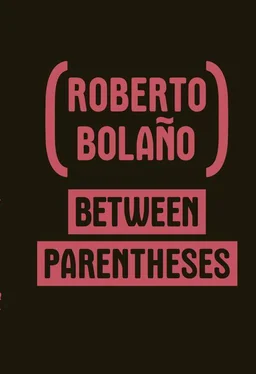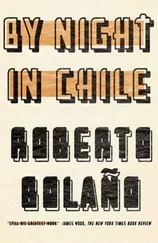Roberto Bolaño - Between Parentheses - Essays, Articles and Speeches, 1998-2003
Здесь есть возможность читать онлайн «Roberto Bolaño - Between Parentheses - Essays, Articles and Speeches, 1998-2003» весь текст электронной книги совершенно бесплатно (целиком полную версию без сокращений). В некоторых случаях можно слушать аудио, скачать через торрент в формате fb2 и присутствует краткое содержание. Год выпуска: 2011, Издательство: New Directions, Жанр: Публицистика, Критика, на английском языке. Описание произведения, (предисловие) а так же отзывы посетителей доступны на портале библиотеки ЛибКат.
- Название:Between Parentheses: Essays, Articles and Speeches, 1998-2003
- Автор:
- Издательство:New Directions
- Жанр:
- Год:2011
- ISBN:нет данных
- Рейтинг книги:4 / 5. Голосов: 1
-
Избранное:Добавить в избранное
- Отзывы:
-
Ваша оценка:
- 80
- 1
- 2
- 3
- 4
- 5
Between Parentheses: Essays, Articles and Speeches, 1998-2003: краткое содержание, описание и аннотация
Предлагаем к чтению аннотацию, описание, краткое содержание или предисловие (зависит от того, что написал сам автор книги «Between Parentheses: Essays, Articles and Speeches, 1998-2003»). Если вы не нашли необходимую информацию о книге — напишите в комментариях, мы постараемся отыскать её.
The Savage Detectives
Between Parenthese
Between Parentheses: Essays, Articles and Speeches, 1998-2003 — читать онлайн бесплатно полную книгу (весь текст) целиком
Ниже представлен текст книги, разбитый по страницам. Система сохранения места последней прочитанной страницы, позволяет с удобством читать онлайн бесплатно книгу «Between Parentheses: Essays, Articles and Speeches, 1998-2003», без необходимости каждый раз заново искать на чём Вы остановились. Поставьте закладку, и сможете в любой момент перейти на страницу, на которой закончили чтение.
Интервал:
Закладка:
SUN AND SKULL
The other day I was at the beach and I thought I saw a dead body. I was sitting on one of the benches along Blanes’s Paseo Marítimo, brushing the sand off my feet, waiting for my son to brush the sand off his feet so we could go home, when I thought I saw a body. I got up and looked again: an old woman was sitting under a beach umbrella reading a book and next to her was a man, the same age or maybe a few years older, in a tiny bathing suit, lying in the sun. This man’s head was like a skull. I saw him and said to myself that he would soon be dead. And I realized that his old wife, reading peacefully, knew it too. She was sitting in a beach chair with a blue canvas back. A small but comfortable chair. He was stretched out on the sand, only his head in the shade. On his face I thought I glimpsed a frown of contentment, or maybe he was just sleeping while his wife read. He was very tan. Skeletal but tan. They were tourists from up north. Possibly German or English. Maybe Dutch or Belgian. It doesn’t really matter. As the seconds went by, his face looked more and more skull-like. And only then did I realize how eagerly, how recklessly, he was exposing himself to the sun. He wasn’t using sunscreen. And he knew he was dying and he was lying in the sun on purpose like a person saying goodbye to someone very dear. The old tourist was bidding farewell to the sun and to his own body and to his old wife sitting beside him. It was a sight to see, something to admire. It wasn’t a dead body lying there on the sand, but a man. And what courage, what gallantry.
THE SINALOA STORY
Barry Gifford, creator of Perdita Durango and Romeo Dolorosa, is known for his habit of giving his fictional characters catchy and colorful names, but in this book, The Sinaloa Story (Destino), the most recent of his novels to fall into my hands, he probably goes too far. The main character is called Ava Varazo, a name that instead of a palindrome hides a dark riddle. Her friend is DelRay Mudo. It’s possible to find weird last names like these among the Mexicans living in the north of Mexico and the southern United States. Unlikely but possible. DelRay’s father, however, is Duro Mudo, and here we head straight into the realm of madness. Ava Varazo’s boss, a thug from the Texas-Mexico border, is Indio Desacato, Mr. Desacato to outsiders, Indio to his friends. The whorehouse madam is Santa Niña de las Putas and her saint day is celebrated “when there is a second full moon in the month on the final day of February in a leap year.” A young messenger and flyweight amateur boxer is Framboyán Lanzar. There’s another boxer called Danny Molasses, whom Lanzar calls Melaza, and another one called Chuy Chancho. Indio Desacato’s bodyguard and factotum is a six-foot-seven, 380-pound former football player called Thankful Priest. The only goodhearted old man in town is called Arkadelphia Quantrill Smith, but his friends — in other words everybody — call him Arky. And so on, through more than fifty names.
What lies behind Gifford’s taste for colorful last names? Many things: the loneliness of the border, that mythical territory between the United States and Mexico, and the loneliness of all men. The madness of parents who try to perpetuate themselves or to perpetuate something they don’t understand but can sense. The desperate pride of possessing at least one thing that’s unique and showing it off. Humorous portraits sketched of dust and wind.
BURROUGHS
For some of those of my generation, William Burroughs was the affectless man, the shard of ice that never melts, the eye that never closes. They say he possessed every vice there was, but I think he was a saint who attracted all the sinners in the world because he was gracious and unwise enough never to shut his door. Literature, his livelihood for the last thirty years, interested him, but not too much, and in that regard he was like other classic American figures who focused their efforts on observing life or on experience. When he talked about what he read one got the impression that he was remembering vague stretches of time in prison.
He was certainly familiar with prison, and his writing on the prison system in the United States might be some of the sharpest ever penned. He traveled all over the world: his vision of the planet is perhaps one of this century’s bleakest. And he experimented with all kinds of drugs and escaped unscathed from fifteen years of heroin addiction.
His observations on certain hard drugs give him a kinship to the great chroniclers of hell, except that in Burroughs there’s no moral or ethical motive, only the description of a frozen abyss, the description of an endless process of corruption. Language, he said, is a virus from outer space, in other words, a disease, and he spent his whole life trying to fight that disease.
He loved guns. He killed his wife while they were practicing their William Tell act in Mexico. He was a follower of Wilhelm Reich and he built orgone boxes in the shabby backyards of lost cities, to which (the cities and the boxes) he retreated like an Andromedan Dracula.
He had no liking at all for life on earth, or human life, and he would rather have been born on any other planet. A planet of spiders or giant insects. In the cover photograph of My Education (Península), he appears with a shotgun, and from the way he looks at us it’s clear he’s not afraid to use it. In his later years he played small roles in a number of films: Drugstore Cowboy was perhaps the most memorable.
NEUMAN, TOUCHED BY GRACE
Among young writers who’ve already published a first book, Neuman may be the youngest of all, and his precocity, which comes studded with lightning bolts and proclamations, isn’t his greatest virtue. Born in Argentina in 1977, but raised in Andalusia, Andrés Neuman is the author of a book of poems, Métodos de la noche [Night Methods], published by Hiperión in 1998, and Bariloche , an excellent first novel that was a finalist for the most recent Herralde Prize.
The novel is about a trash collector in Buenos Aires who works jigsaw puzzles in his spare time. I happened to be on the prize committee and Neuman’s novel at once enthralled — to use an early twentieth-century term — and hypnotized me. In it, good readers will find something that can be found only in great literature, the kind written by real poets, a literature that dares to venture into the dark with open eyes and that keeps its eyes open no matter what. In principle, this is the most difficult test (also the most difficult exercise and stretch) and on no few occasions Neuman pulls it off with frightening ease. Nothing in this novel sounds contrived: everything is real, everything is an illusion. The dream in which Demetrio Rota, the Buenos Aires trash collector, moves like a sleepwalker, is the dream of great literature, and its author serves it up in precise words and scenes. When I come across these young writers it makes me want to cry. I don’t know what the future holds for them. I don’t know whether a drunk driver will run them down some night or whether all of a sudden they’ll stop writing. If nothing like that happens, the literature of the twenty-first century will belong to Neuman and a few of his blood brothers.
COURAGE
Everything there is to say about courage has already been said by the poet Archilochus, who lived in the seventh century BC. Of his tumultuous life little is known with certainty. He was born on the island of Paros and he was a mercenary and his inclinations may have been more Dionysian than Apollonian. “My ash spear is my barley bread, / My ash spear is my Ismarian wine. / I lean on my spear and drink,”§ he wrote. There’s little doubt that he took part in small battles, in countless skirmishes where glory shone by its absence, under the command of different lords. During one of these encounters, Archilochus himself tells us, he abandoned his shield and ran, which in that age was synonymous with shame and dishonor. And yet Archilochus tells or sings of his cowardice without the slightest blush: “Some Saian mountaineer / Struts today with my shield. / I threw it down by a bush and ran / When the fighting got hot. / Life seemed somehow more precious. / It was a beautiful shield. / I know where I can buy another / Exactly like it, just as round.”
Читать дальшеИнтервал:
Закладка:
Похожие книги на «Between Parentheses: Essays, Articles and Speeches, 1998-2003»
Представляем Вашему вниманию похожие книги на «Between Parentheses: Essays, Articles and Speeches, 1998-2003» списком для выбора. Мы отобрали схожую по названию и смыслу литературу в надежде предоставить читателям больше вариантов отыскать новые, интересные, ещё непрочитанные произведения.
Обсуждение, отзывы о книге «Between Parentheses: Essays, Articles and Speeches, 1998-2003» и просто собственные мнения читателей. Оставьте ваши комментарии, напишите, что Вы думаете о произведении, его смысле или главных героях. Укажите что конкретно понравилось, а что нет, и почему Вы так считаете.












